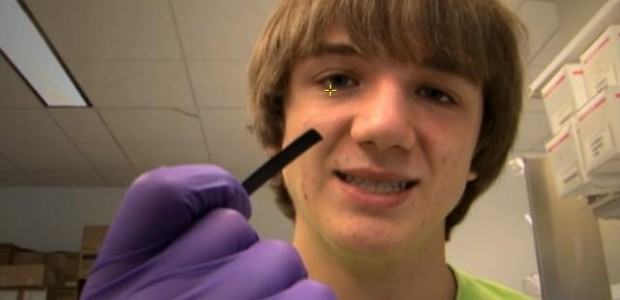A 15-year-old teenager could help save millions of people with the revolutionary low-cost diagnostic test that he has invented to detect pancreatic cancer at an earlier stage.
Who is this teenage wunderkind? His name is Jack Andraka, and some of the top medical researchers in the United States are calling him the “Edison” of modern times! Andraka has developed a simple dip-stick diagnostic test which can detect levels of mesothelin, a biomarker for early stage pancreatic cancer found in the urine and blood.
This new test shows incredible promise, and it could easily revolutionize the treatment of this deadly form of cancer. As it stands, pancreatic cancer kills 19 out of the 20 people who are diagnosed within the first five years. This disease has remained so deadly because, up until now, it had been incredibly difficult to diagnose pancreatic cancer before it had reached a more advanced stage.
Teenage Prodigy Awarded $75,000 for Revolutionary Diagnostic Test
Andraka was awarded the grand prize of $75,000 in scholarship funds at the 2012 Intel Science Fair for his invention. Now with this simple dip-stick test, medical professionals have a viable method of detecting pancreatic cancer in patients before it becomes more invasive and untreatable. In fact, the revolutionary sensor that Andraka has created is 28 times quicker and over a 100 times more sensitive than the current diagnostic tests that are available (it is also 28 times less expensive!).
By implementing this test, Andraka hopes to achieve a significant increase in the survival rates for patients with pancreatic cancer. Now, there should be more patients who will be able to seek medical help while there is still a decent chance of treating their disease.
This diagnostic test works in a way that is very similar to diabetic testing strips. Andraka’s new test only requires patients to give a drop of blood, and the paper strip will be able to show if they are carrying the mesothelin biomarker. Researchers have been astonished by the accuracy rate of this test—reported to be over 90 percent accurate—and the results are visible almost instantaneously.
Wide Range of Application for this New Test
Pancreatic cancer is not the only type of cancer that this test can be used for. Oncologists could use it to detect lung and ovarian cancer as well. In fact, it could be easily altered to detect the biomarkers for a wide range of other medical conditions.
“What’s so cool about that is its applicability to other diseases…for example other forms of cancer, tuberculosis, HIV, environmental contaminants like E Coli, salmonella,” explains Andraka. “All for three cents for a test that takes five minutes to run.”
Inspired to Combat Pancreatic Cancer
Andraka was inspired to create this test after a close family friend succumbed to pancreatic cancer. He had experimented with a number of other tactics, but it was after reading a journal article on carbon nanotubes in biology class that he had his epiphany. However, a revolutionary idea is not enough, because you also need persistence. Andraka was rejected by nearly 200 different scientists as he looked for additional assistance with his research.
After much tenacity, he finally received a vote of confidence from Dr. Anirban Maitra, a professor of pathology and oncology at Johns Hopkins University. Dr. Maitra not only offered to mentor Andraka as he worked on developing his test, but he also agreed to let him work in his lab at the university.
How the Test Works
In order to create the test, Andraka combined human mesothelin-specific antibodies with single-walled carbon nanotubes. He then took this mixed product and coated strips of ordinary filter paper. The nanotubes actually make the filter paper conductive, and the antibodies will bind to the biomarker and enlarge when mesothelin is applied. The enlarged antibodies cause the nanotubes to spread apart, and this alters the electrical properties of the strips.
If there is a larger concentration of mesothelin present, then more antibodies will bind and grow, and the resulting electrical signal will become weaker. This gives scientists a significantly more accurate measure of the patient’s biomarker levels.
Making the Test Available to the Public
Currently, this modern-day “Edison” plans on mass-marketing the new test in order to make it widely available to the community, which is something he hopes will change the balance of power in medicine. His dream is to make this diagnostic test easily available to the public at any of their local drug stores. If you suspected that you may have pancreatic cancer, or were at risk for it, then you would be able to go pick up a test and find out for sure.
